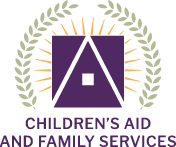Dear Friends,
I hope you and your loved ones are well as we continue to deal with the challenges caused by the pandemic. The past two years have been uncertain to say the least, and we’ve all been affected. I am deeply grateful to you for your steadfast commitment to the agency and those we serve.
I’m pleased to tell you last year was extremely positive for Children’s Aid and Family Services. In fact, the agency has never been in better shape than it is today, as both an organization and a provider of life-changing services. It is financially stable, growing its services and staffed by dedicated employees who put the needs of those we serve first. I’m delighted to present highlights of our work in 2021:
Helping Individuals with Intellectual and Developmental Disabilities
- The agency opened two new community residences for individuals with intellectual and developmental disabilities. Because we have more homes we are able to decrease the number of people living in each community residence. Our clients and their families are thrilled. One parent wrote to us, “CAFS promised when they took over that they will provide housing for about four – as opposed to 10 – per home and they kept their promise! I’m so glad I entrusted our son’s care to them.”
- We renovated the second floor of our administrative building in Paramus to house a new pre-vocational program to better serve our clients. Thanks to funding from the William Randolph Hearst Foundation and Bergen County, the members of STRIVE Day program are learning work readiness skills that will prepare them to work in the community. There are 75 members in the program and many of them are eager to get to work!
- The Cope Institute for Professional Success was launched in 2020 to teach, coach and educate the agency’s Direct Support Professionals and other Disability Support Professionals, ensuring that they have the knowledge and skills that constitute best practices in community support. The Cope Institute was featured by both CQL (The Council on Quality and Leadership) and NADSP (National Alliance for Direct Support Professionals) for its leading and innovative efforts in promoting professional development and support for Direct Support Professionals, who are vital to the wellbeing of our clients.
Alcohol and Drug Misuse Prevention and Recovery Supports
- The Center for Alcohol and Drug Resources hosted its first annual youth conference, Seeds of Change, for Bergen County high school students. Expert speakers presented information about Diversity, Equity and Inclusion. More than 60 teenagers attended the conference, representing seven Bergen County school districts.
- Research indicates that in some communities more than half of individuals who are homeless misuse alcohol and drugs. In partnership with law enforcement, mental health and homeless services, the Recovery Support Services team participated in Operation Homecoming, an initiative designed to locate homeless persons in Englewood and connect them with needed services. As a result of the success of the initial effort, the Recovery Support Services team continues to conduct weekly outreach in Englewood. A tent is set up on the center of town that has on-the-spot help where individuals are connected in “real time” to recovery support, treatment, mental health and other services.
- The Center deepened its commitment to alcohol and drug prevention education for older adults, an often overlooked population. It launched a “Tablets for Seniors” program, which helps older people connect with loved ones to help ease the loneliness caused by the pandemic and increases their access to and ability to use technology. Thanks to funding from a generous grant, The Center now has a lending library of adult-friendly tablet computers and provides training and technical assistance to seniors living in Bergen and Passaic Counties. The Center also expanded its virtual programming offered to seniors to include cooking, crafting and other recreational activities along with programs that focus on medication management, self-care and healthy aging. Additionally, an engaging monthly newsletter for older adults was created and has a readership of more than 1,400 older adults.
Help for Children and Families
- WISE Families program works with families with children, ages 8 – 15, who have problems with sexual boundaries. It has a 98% success rate and is recognized as a model intervention program that has helped 374 children and their families since its inception. The program was recently selected by Rutgers University to participate in a year-long research project to assess the program, and provide a comprehensive evaluation of the effectiveness of it.
- Our Treatment Home program had to revise its strategy for recruiting prospective therapeutic foster parents because of the pandemic. With in-person information sessions on hold, we launched a targeted advertising campaign on social media and began hosting webinars on Zoom to introduce prospective foster parents to the agency. The attendance at the sessions increased by 100% vs. in-person sessions, and the largest number of families in one year were licensed to become therapeutic foster parents with the agency.
- Clinicians in our Therapeutic Supervised Visitation program advocated to the Division of Children and Families on behalf of the children they treat to ensure they were provided with transportation so they could continue to see their parents during the pandemic. It’s critically important for our children to maintain a relationship with their parents during treatment.
We asked for help throughout the year and you unfailingly answered the call, whether it was donating generous monetary gifts, supplying baby essentials or helping a young person leaving foster care with education expenses. We couldn’t provide these services without your support! Thank you and be well.
Sincerely,
Robert B. Jones, Ph.D.
President & CEO
